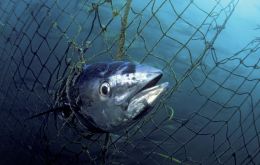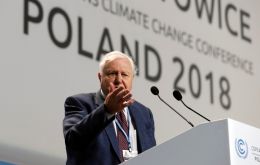MercoPress. South Atlantic News Agency
Tag: Climate change
-
Thursday, January 3rd 2019 - 08:39 UTC
Bluefin tuna back in UK waters: long term ocean current warming

Growing numbers of bluefin tuna are being seen in the waters around the UK because of the warming impact of a long-term ocean current say researchers. These large, speedy fish are a globally endangered species and almost disappeared from the UK around 40 years ago.
-
Friday, December 28th 2018 - 08:49 UTC
Sir David Attenborough still has hope for the future of the planet

Sir David Attenborough says he still has “hope” for the future of the planet. But the Blue Planet and Dynasties narrator says that human beings have to turn their gaze away from themselves.
-
Wednesday, December 19th 2018 - 10:07 UTC
Newly discovered amphibian has been named after Donald Trump

United States presidents tend to receive their fair share of honors, but Donald Trump may want to ignore his latest one. A newly discovered amphibian that buries its head in the sand has been named after him, apparently in response to his comments about climate change.
-
Wednesday, December 12th 2018 - 08:29 UTC
Brazil's future environment minister favors remaining in Paris Agreement but with country autonomy

Brazil’s future environment minister under President-elect Jair Bolsonaro said that the country should stay in the Paris Agreement on climate change, but the world must also respect its autonomy to set its environmental policies.
-
Monday, December 10th 2018 - 09:41 UTC
French military join WWF France to combat climate change as a “national security threat”

France’s military has teamed up with an environmental non-profit organization for the first time to study the threat of climate change where the country is at war, a representative of the green group said. So far, WWF France and the Ecole de Guerre, the top French military academy, have been jointly promoting their view that climate change is a national security threat.
-
Wednesday, December 5th 2018 - 09:17 UTC
Norway pays Brazil US$ 70m for deforestation reduction in the Amazon in 2017

Norway will pay Brazil US$ 70 million for reducing deforestation in the Amazon in 2017 but is concerned over a more recent surge in the destruction of the world's largest tropical rainforest, according to a Norwegian government statement.
-
Tuesday, December 4th 2018 - 08:58 UTC
“Collapse of civilization on the horizon” because of climate change declared Sir David Attenborough

The collapse of civilization and extinction of much of the natural world is “on the horizon” due to climate change, Sir David Attenborough declared at the opening day UN climate talks in Poland.
-
Monday, December 3rd 2018 - 06:34 UTC
UN chief welcomes G20 commitment to fight climate change

UN Secretary-General, António Guterres, has welcomed the declaration released on Saturday at the conclusion of the 2018 G20 meeting of the world’s leading economies, in Buenos Aires, Argentina, which reaffirms a commitment to raise ambition in the fight against climate change.
-
Sunday, December 2nd 2018 - 01:40 UTC
UN Remarks to G20 session on Climate and Sustainable Development

In order to accomplish the 2030 Sustainable Development agenda, United Nations consider the big trouble in relation to climate change the world is suffering. UN Secretary General Antonio Guterres remarks to G20 session on Climate and Sustainable Development as an advice on the “greatest threat to human security and sustainable development and that climate change is still running faster than we are”.
-
Thursday, November 29th 2018 - 08:31 UTC
Brazil withdraws its offer to host UN conference on climate change next year

Brazil has withdrawn its offer to host a large U.N. conference on climate change next year, the foreign ministry said on Wednesday, leading environmental groups to question the government's commitment to reducing carbon emissions.
